Revolutionizing E-Commerce Search: MCP, AI, and Elasticsearch
Discover how AI, MCP, and Elasticsearch can be used for semantic product search in e-commerce. See the tangible benefits of smarter, more nuanced search capabilities.

In today’s e-commerce, search is no longer just about keywords. It’s about understanding user intent. And that’s exactly where AI-powered product search with MCP and Elasticsearch changes the game.
By combining Elasticsearch’s powerful filtering, AI’s semantic understanding, and the MCP server’s ability to unify search processes, retailers can deliver results that truly match what customers mean — not just what they type.
In this post, WebbyLab explores how Elasticsearch and MCP server AI integration work together to revolutionize e-commerce search, drawing on our hands-on experience and real-world AI implementation cases.
Highlights:
- Traditional search methods often fail, as keyword-based engines cannot always accurately capture user intent.
- The combination of MCP, Elasticsearch, and AI turns a regular search bar into an intelligent, intent-driven product discovery engine.
- Hybrid vector search for e-commerce means higher conversions, improved UX, and reduced support load.
Why Traditional E-Commerce Search Fails
The search bar is often where the buying journey begins. And sometimes, where it ends. Why? Traditional e-commerce search is limited by keyword-only logic, filters, and basic text matches. This used to work earlier, but not with today’s massive product catalogs and growing user expectations.
The main limitations are:
- Search intent mismatch. Classical search models only match exact words in product names, descriptions, or categories. They can’t interpret context or intent, leading to what we call search intent mismatch. For instance, when a shopper types “sneakers”, they might completely miss out on listings labeled “running shoes” or “trail footwear.” This leads to lost conversions for businesses.
- Performance and scaling problems. As catalogs grow larger and more diverse, keyword-based search issues only get worse. Queries become slower, filters overload the system, and relevant items get buried under unrelated results.

On the other hand, AI-driven semantic search already:
- Analyzes the content of the request.
- Understands the intention.
- Takes synonyms and user behavior into account.
Thanks to this, the results are more relevant, and the customer experience is more natural and convenient. And that is precisely why semantic search for online stores is the logical next step.
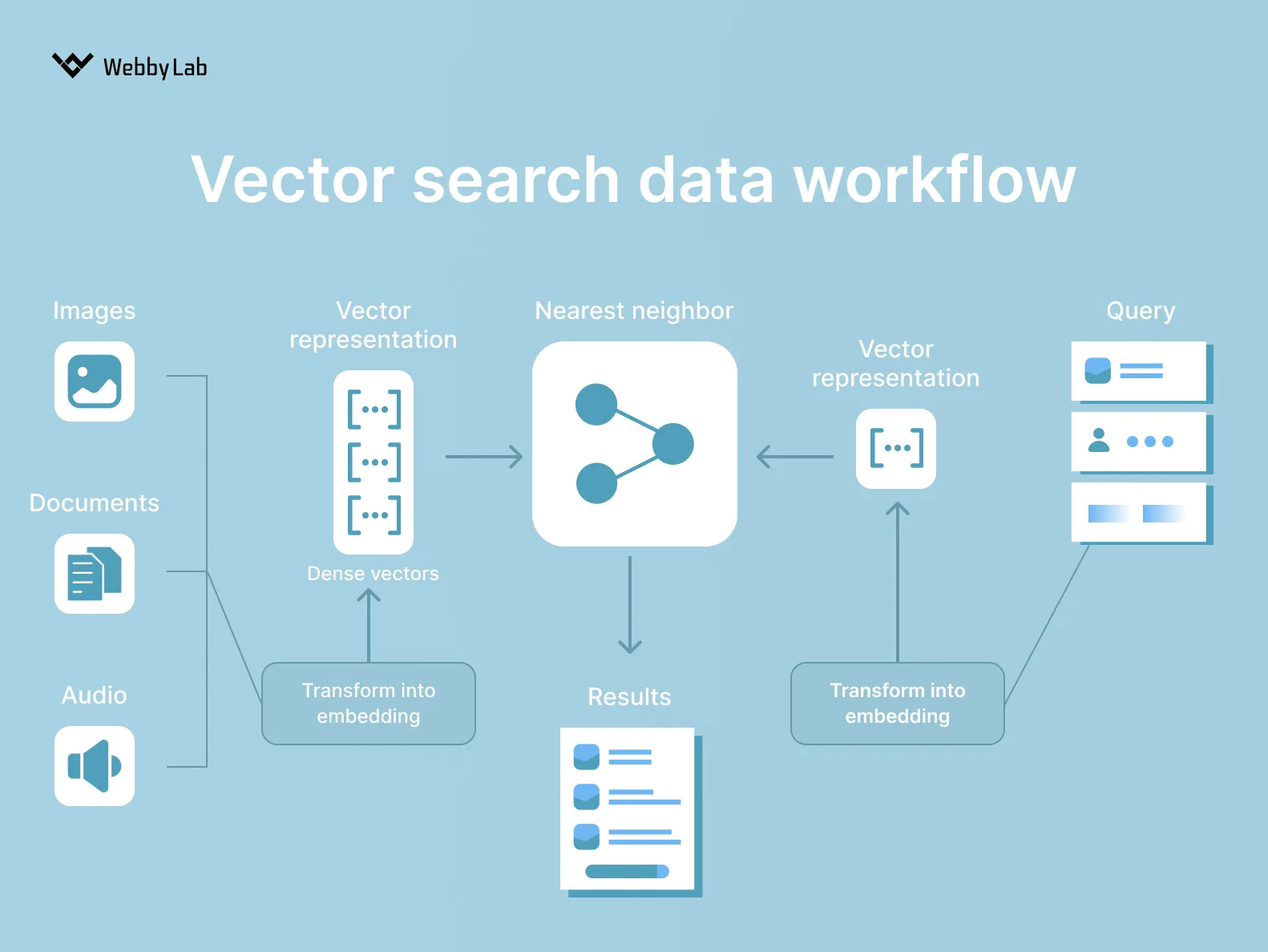
Vector search flow
Introducing the AI + MCP + Elasticsearch Approach
By now, it should be clear that keyword-only search is outdated. The new norm is a combination of Elasticsearch, AI, and MCP.
- Elasticsearch. Handles the traditional full-text search.
- AI embeddings. Capture the meaning behind the user’s query and identify contextually similar products, one example of how AI transforms business operations.
- MCP server. Works as an orchestration layer, the bridge between the user, AI embeddings, and Elasticsearch.

The way the AI + MCP + Elasticsearch architecture works
AI-powered product search with Elasticsearch and MCP offers flexibility, modularity, and multi-client integration — a perfect combination of perks for growing e-commerce catalogs.

What’s Inside the Architecture? A Breakdown of Each Layer
To truly appreciate the power of semantic product search with AI, MCP, and Elasticsearch, let’s take a closer look at how it works. Here’s the architecture breakdown:
MCP Server
MCP (Model Context Protocol) is an open-source standard for connecting AI applications to external systems. Thanks to MCP, AI apps such as Claude or ChatGPT can connect and retrieve information from:
- Data sources (local files, databases).
- Tools (search engines, calculators).
- Workflows (specialized prompts).
The MCP server LLM integration acts as a single gateway between the search engine and the client. Its core task in the whole setup is to:
- Receive the user’s natural language request.
- Invoke the AI layer, which generates an embedding (vector representation) of that specific query.
- Pass the query request to Elasticsearch.
- Receive the search results from Elasticsearch and return them to the user.
Elasticsearch
Elasticsearch, an open-source search engine and data analysis system, plays a dual role as a data repository and an execution engine.
It performs two search tasks:
- Full-text search (the traditional keyword search).
- Vector-based search (the hybrid search that blends the lexical (keyword) and semantic (vector) queries, owing to Elasticsearch’s support for dense vector fields).
This AI + Elasticsearch integration ensures that when a user searches for something like “lightweight office chair,” Elasticsearch can retrieve results that are both textually and semantically similar, from “ergonomic desk chair” to “minimalist swivel chair.”
AI Layer
This is where language understanding in AI systems happens. Using models that support text-to-embedding conversion (like gemini-embedding-001), it converts search queries and product data into vectors that represent their semantic relationships.
In simple terms, AI understands that “running shoes,” “sneakers,” and “trail footwear” belong to the same conceptual space, even if the words differ.
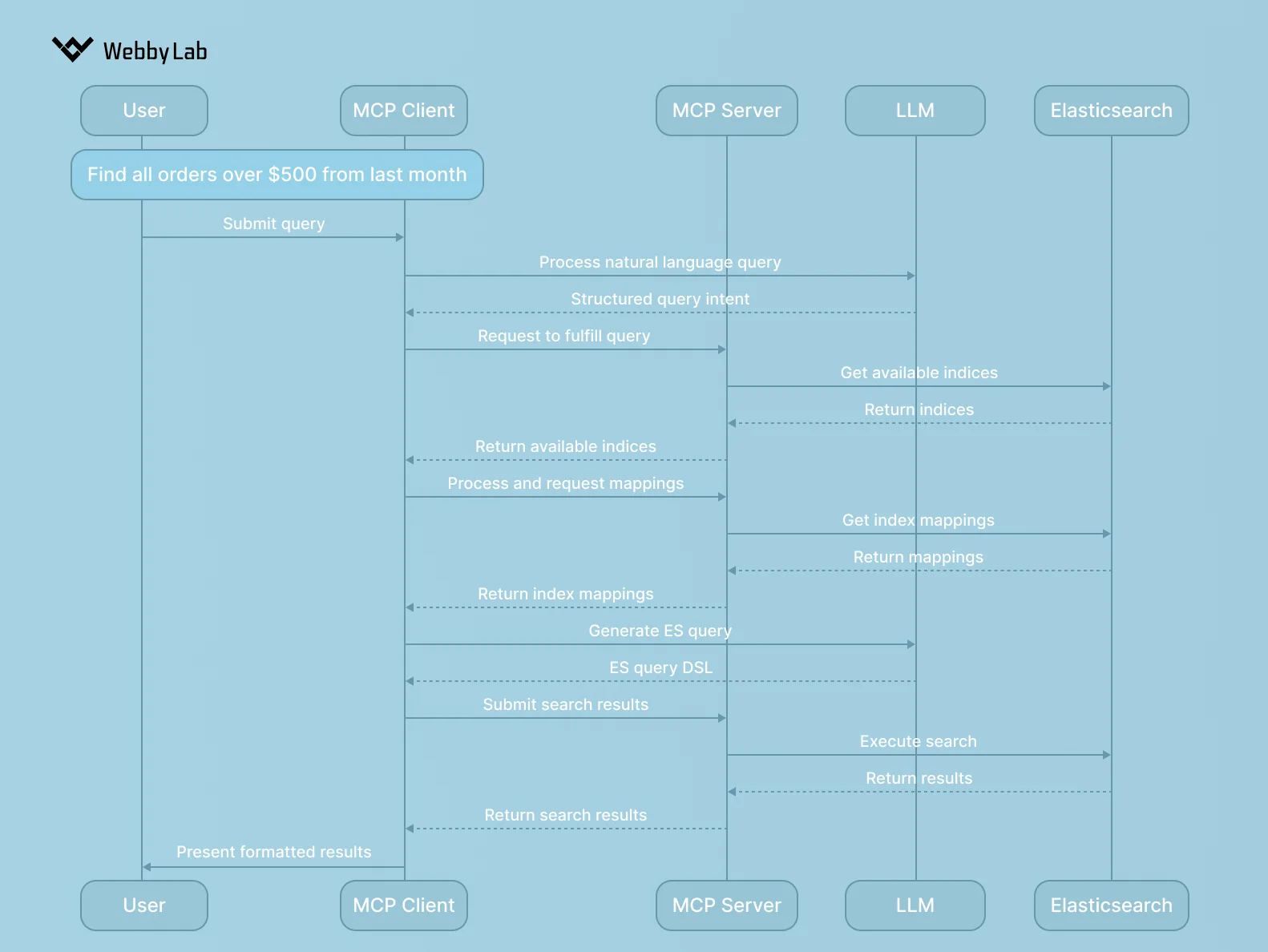
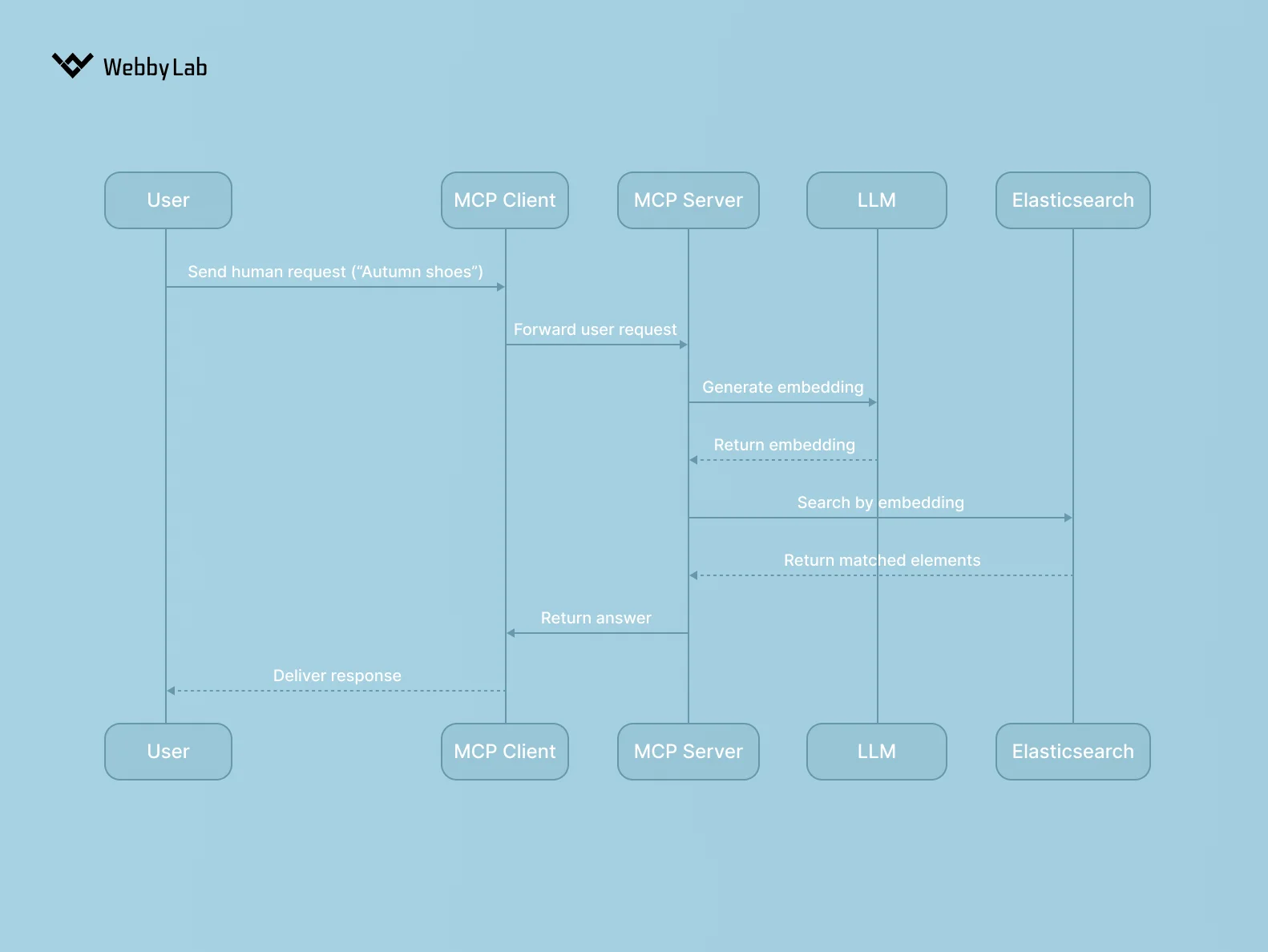
AI + MCP + Elasticsearch architecture.
Curious how this architecture could enhance your store’s search? Get a consultation with the WebbyLab team
Get a consultationHow Do We Evaluate AI Models? (Mathematical Comparison Explained)
Choosing an optimal embedding model for semantic product search requires multi-criteria analysis. To make our AI embeddings comparison fair and transparent, we used the Weighted Sum Model (WSM).
This weighted scoring model helps us weigh multiple factors (e.g., price, embedding dimensionality) according to their importance and then combine them into one unified score.
Here’s the formula itself:
Where:

Each factor (e.g., cost, number of dimensions) is first normalized, meaning we scale it between 0 and 1, using the following formula:

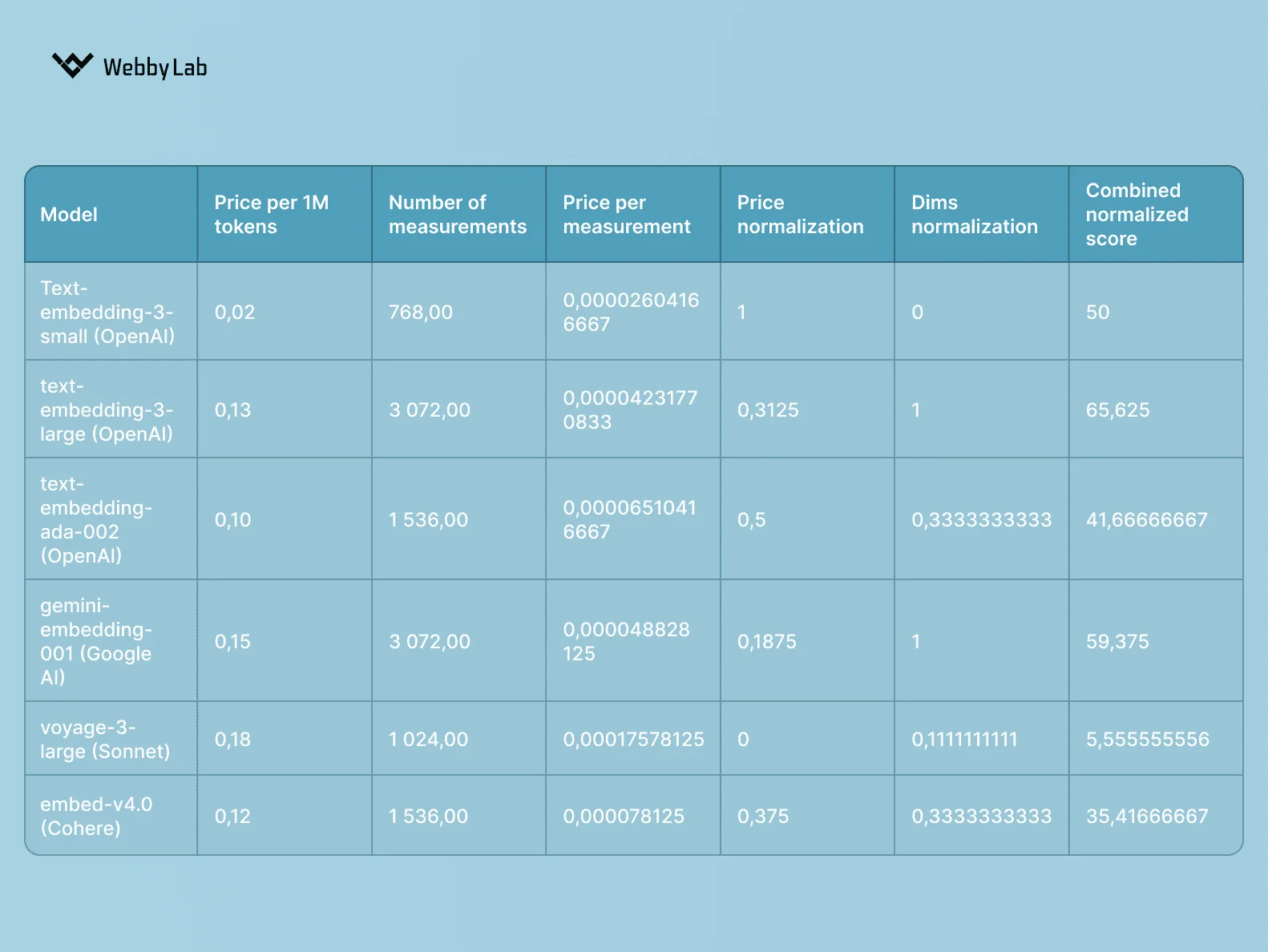
Higher-dimensional embeddings typically offer better vector similarity. They capture more nuanced relationships between words and product attributes. Yet, more dimensions mean higher computational costs.
We’ve also modeled the application of the method for different weight coefficients.
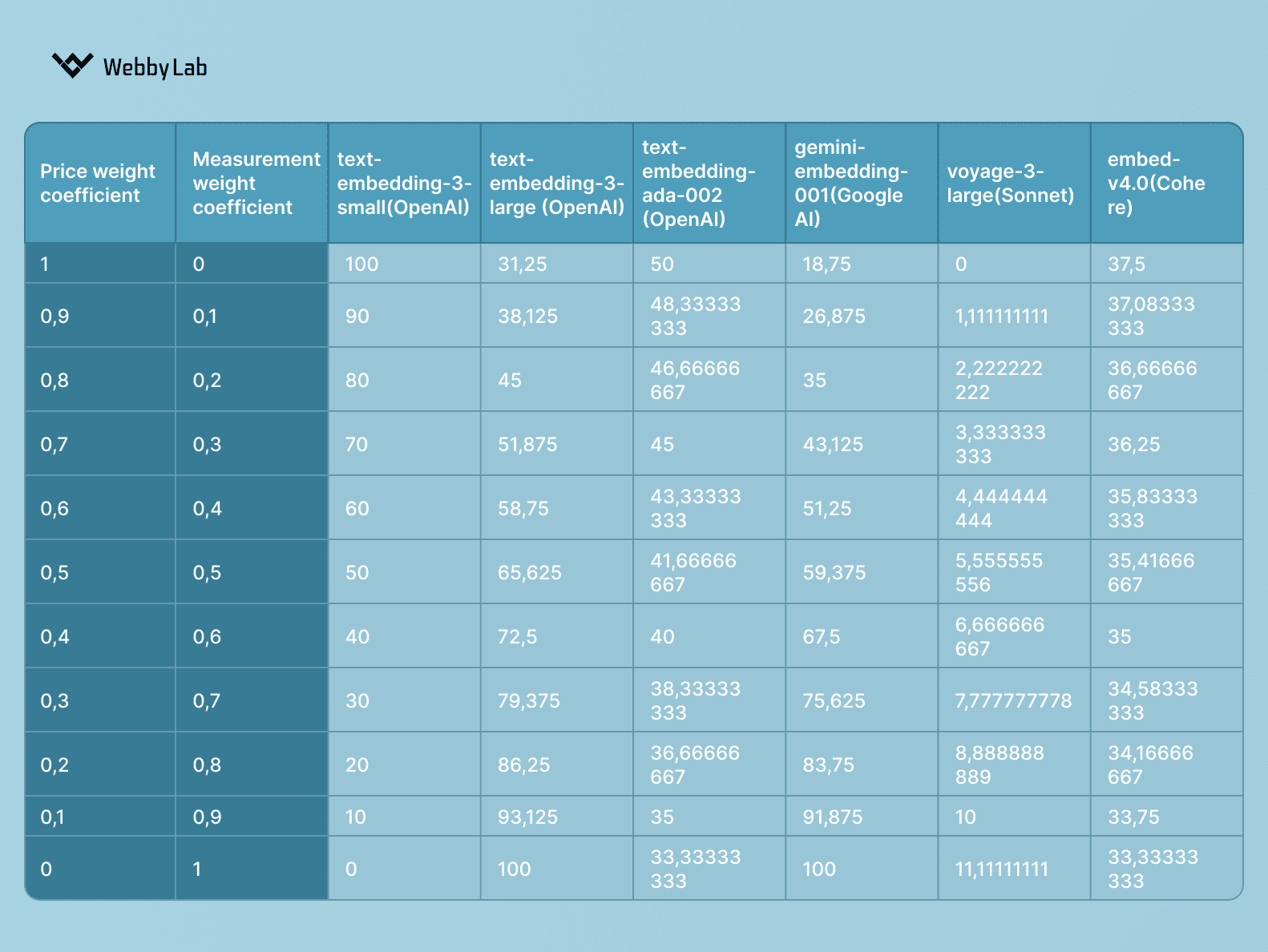
From the diagram below, you can see that the model with the highest indicators on the Y axis and the smallest fluctuations relative to this axis is the most profitable and resistant to changes in weight coefficients.
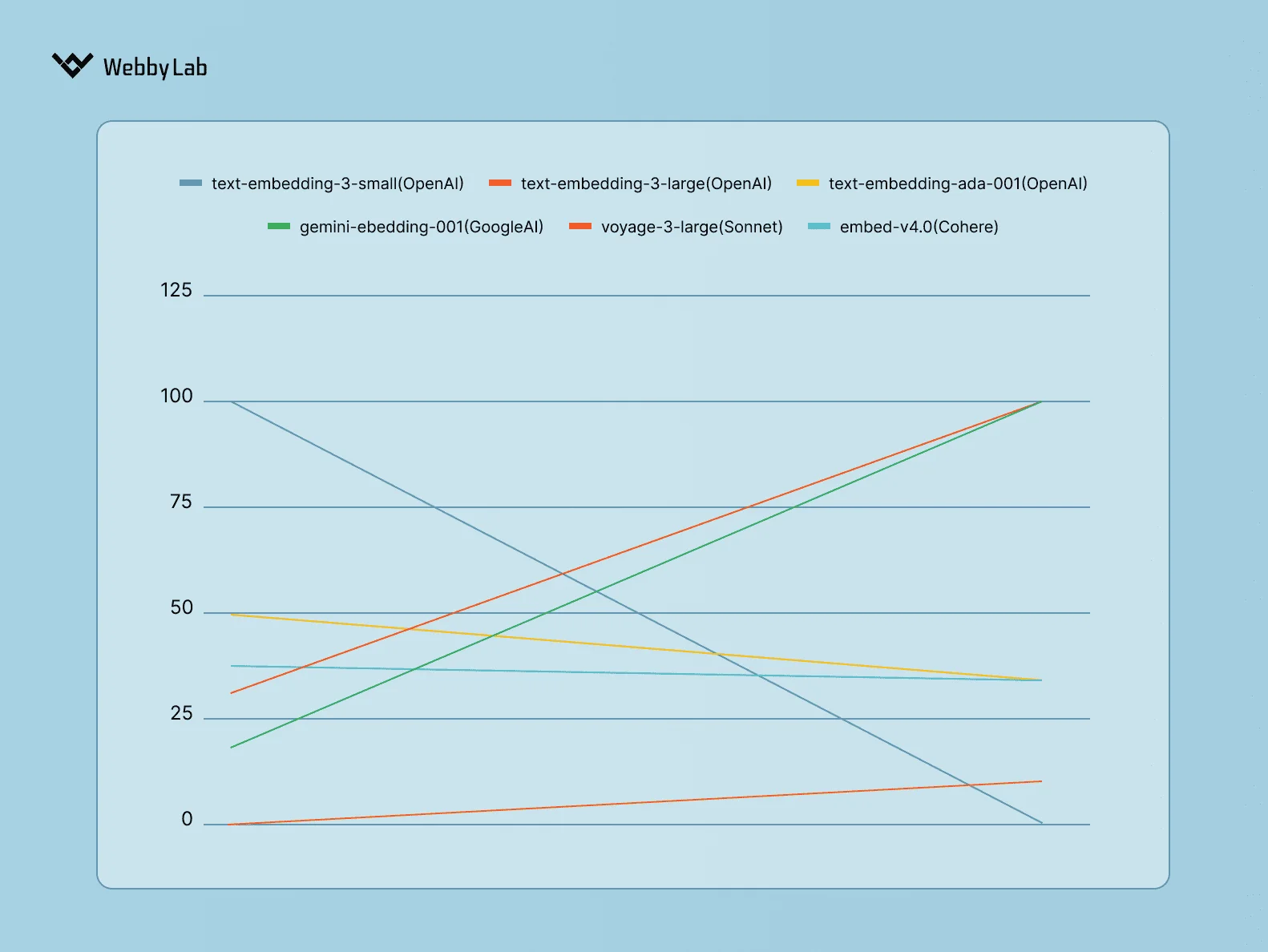
The chart of evaluation values by criterion weight
After running several iterations with varying weight ratios, our model evaluation determined gemini-embedding-001 as the best-balanced model.
Exploring different AI embeddings? Make the whole process easier with our AI software development services.
Browse moreWhat Are the Real Business Benefits for E-Commerce Platforms?
You’ve seen the technical part, but at the end of the day, the tech is only as valuable as the results it brings to your business. Here are just several AI-powered e-commerce search benefits:
- Higher conversion rate through better relevance.
- Improved UX via contextual understanding.
- Scalable for large catalogs and multilingual search.
- Reduced support load and “no results” frustration.
Let’s also summarize the differences between AI product discovery and traditional search so you can see the semantic search advantages more clearly.
| Feature | Classic search | AI search |
| Relevance | Matches exact keywords only | Understands meaning and intent |
| UX | Users must guess the right phrasing | Feels conversational |
| Scalability | Struggles with large catalogs | Handles massive, multilingual datasets |
| “No results” queries | Frequent | Rare |
| Conversion impact | Moderate | High, enables e-commerce conversion optimization |
WebbyLab Implementation Example: From Query to Results
To show how this approach works in real life, let’s look at WebbyLab’s demo implementation: a hybrid product search system powered by MCP, AI, and ElasticSearch.
Here’s what happens behind the scenes when a user searches for “autumn shoes”:
- Client sends the request → “Autumn shoes.”
- The MCP server receives the request and calls the AI model to generate a vector representation.
- The MCP server creates a combined query in Elasticsearch (text + vector).
- Elasticsearch returns a ranked list of the most relevant and semantically similar products.
- The MCP server formats and optimizes the response, sending it back to the client, which instantly displays curated product results to the user.

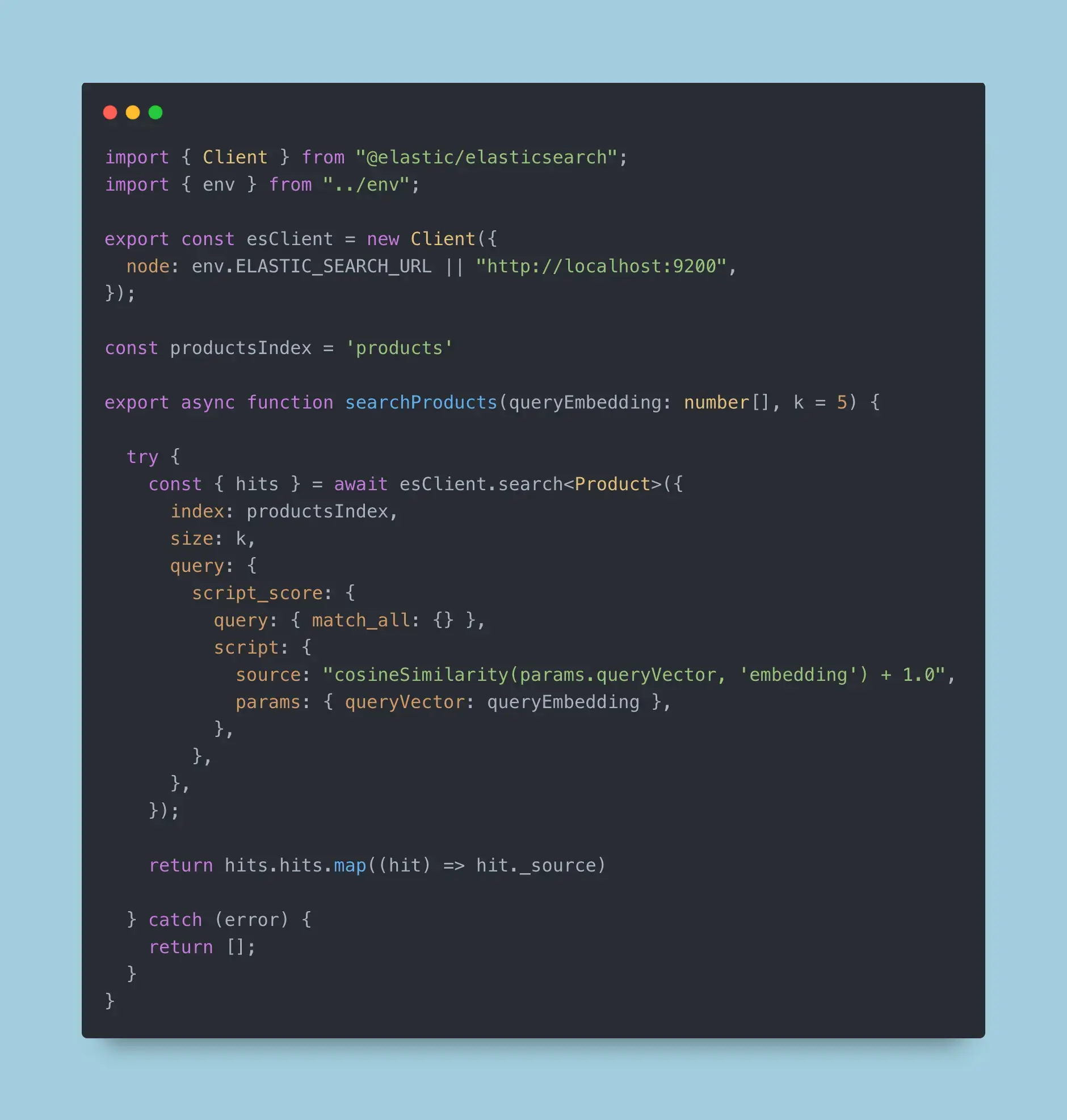

Example code snippet for WebbyLab’s AI-based search solution
This setup allows Elasticsearch product discovery to feel human. And because it’s built on modular standards, WebbyLab’s MCP AI e-commerce integration scales easily across web, mobile, and chatbot interfaces, while staying compatible with major e-commerce platforms.

Looking to leverage AI search engine for online stores? Handle custom e-commerce development with WebbyLab
View our servicesFinal Words
Traditional search engines often fail to capture the real intent behind user queries. Yet, with MCP server integration, Elasticsearch, and AI-powered product search, this changes completely. The hybrid semantic search approach transforms plain text into meaningful, contextual insights. For businesses, that means higher relevance, smoother experiences, and stronger conversion rates.
Written by:

Maksym Bezvugliak
Software Developer
I’m a software developer with extensive experience in creating web and mobile applications. Over the years, I’ve worked with a variety of technologies, focusing on building reliable, user-centered products and writing maintainable, thoughtful code. I enjoy exploring new tools and approaches, improving development processes, and turning ideas into practical digital solutions.
Rate this article !
22 ratingsAvg / 5



